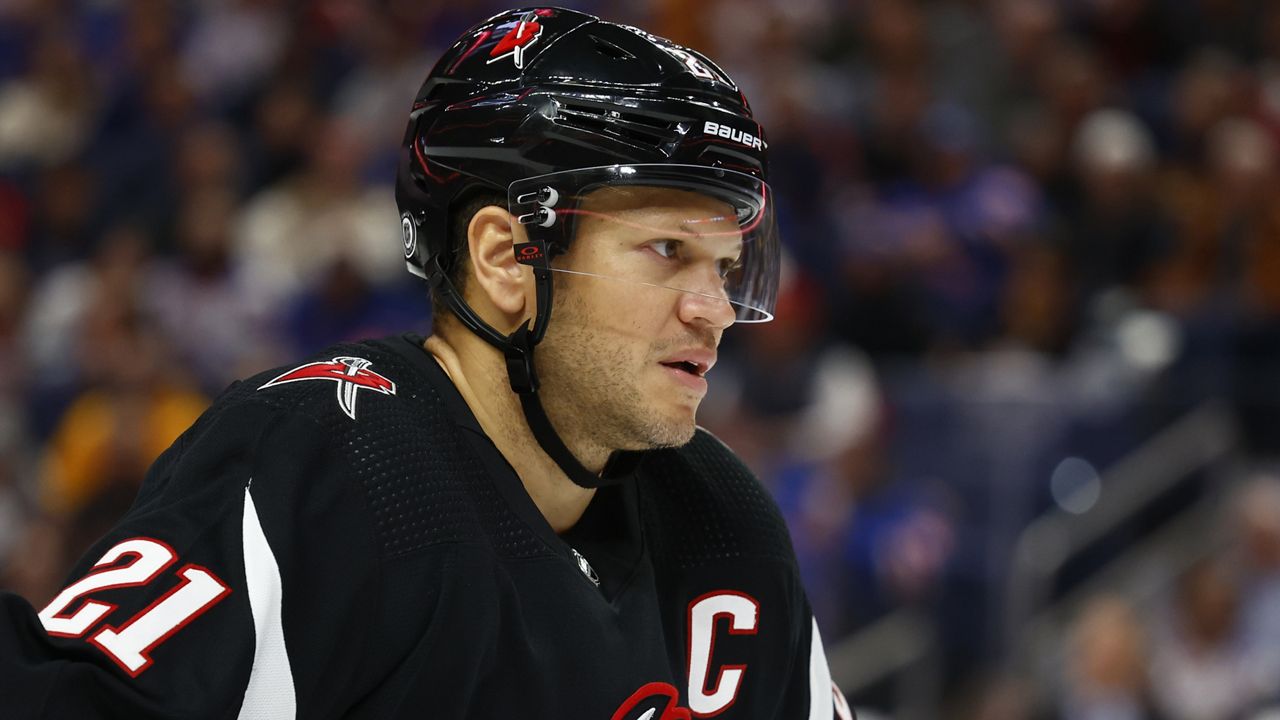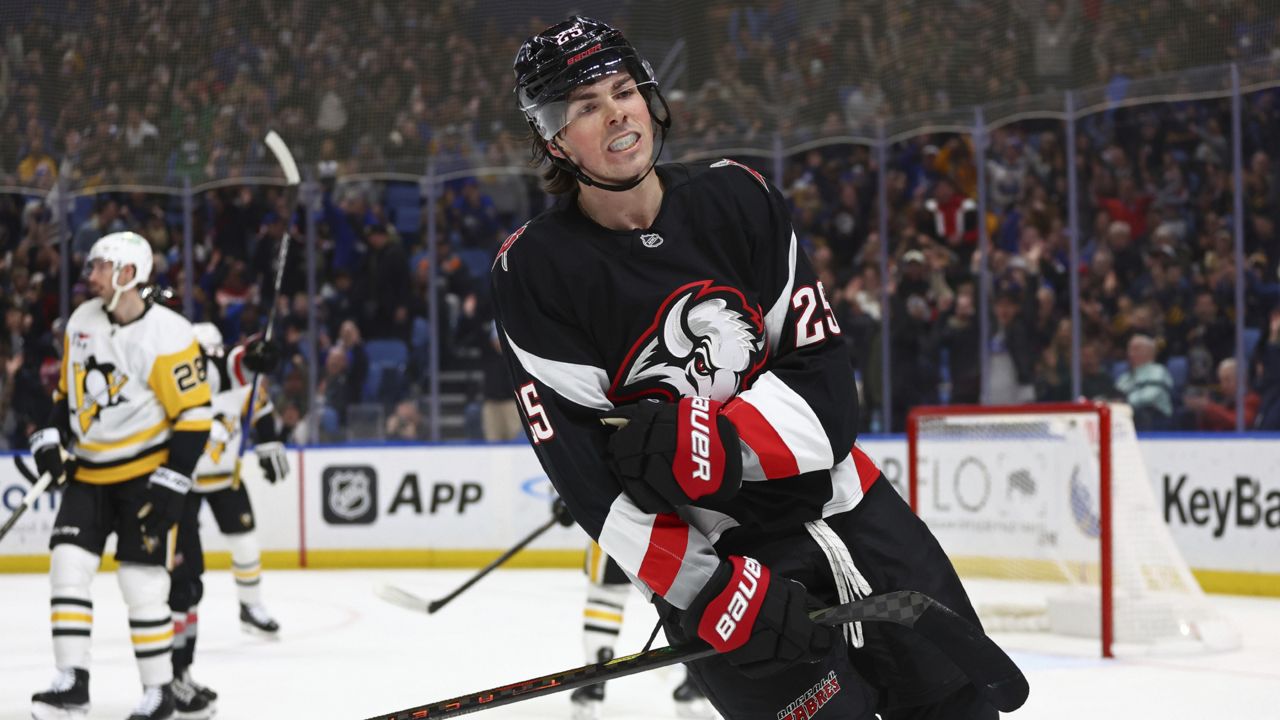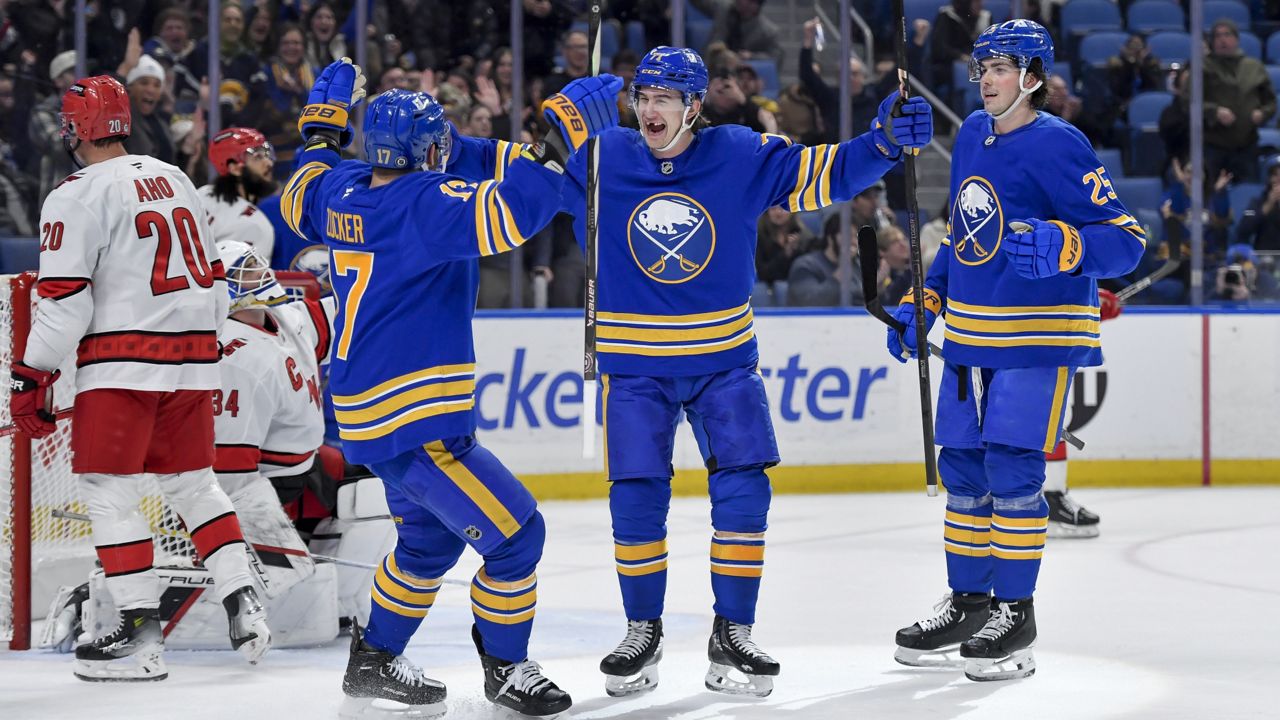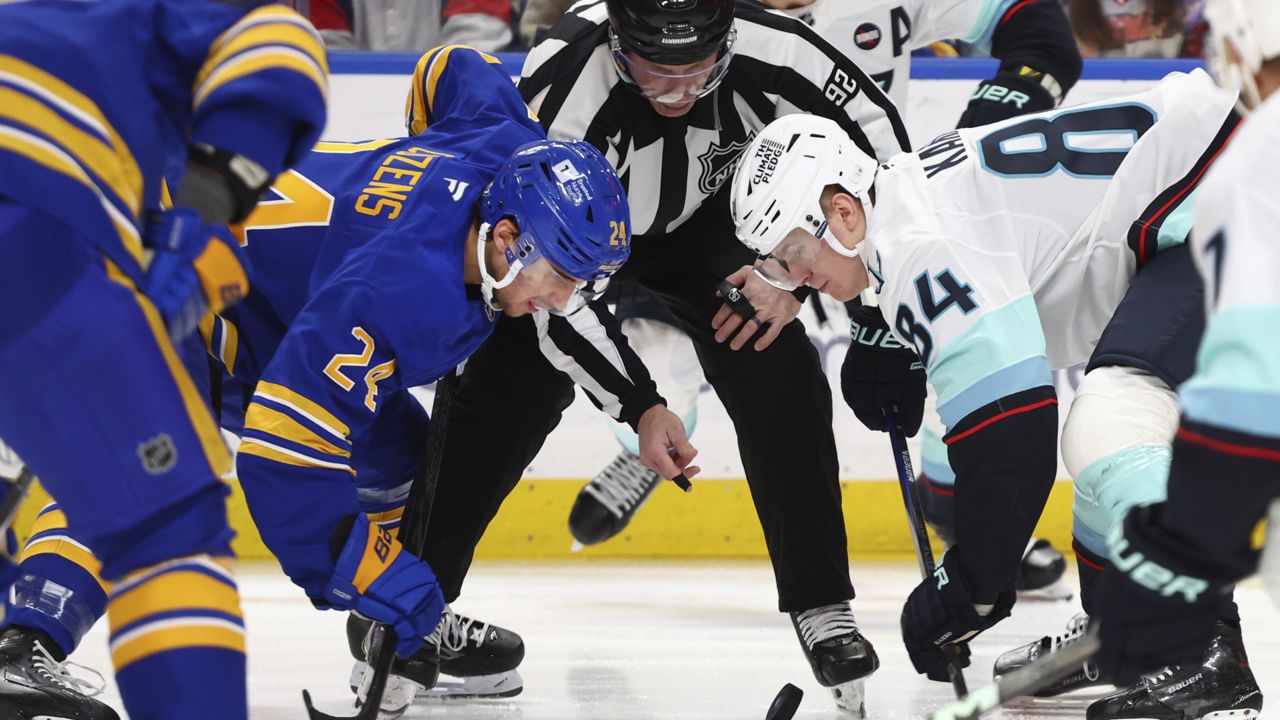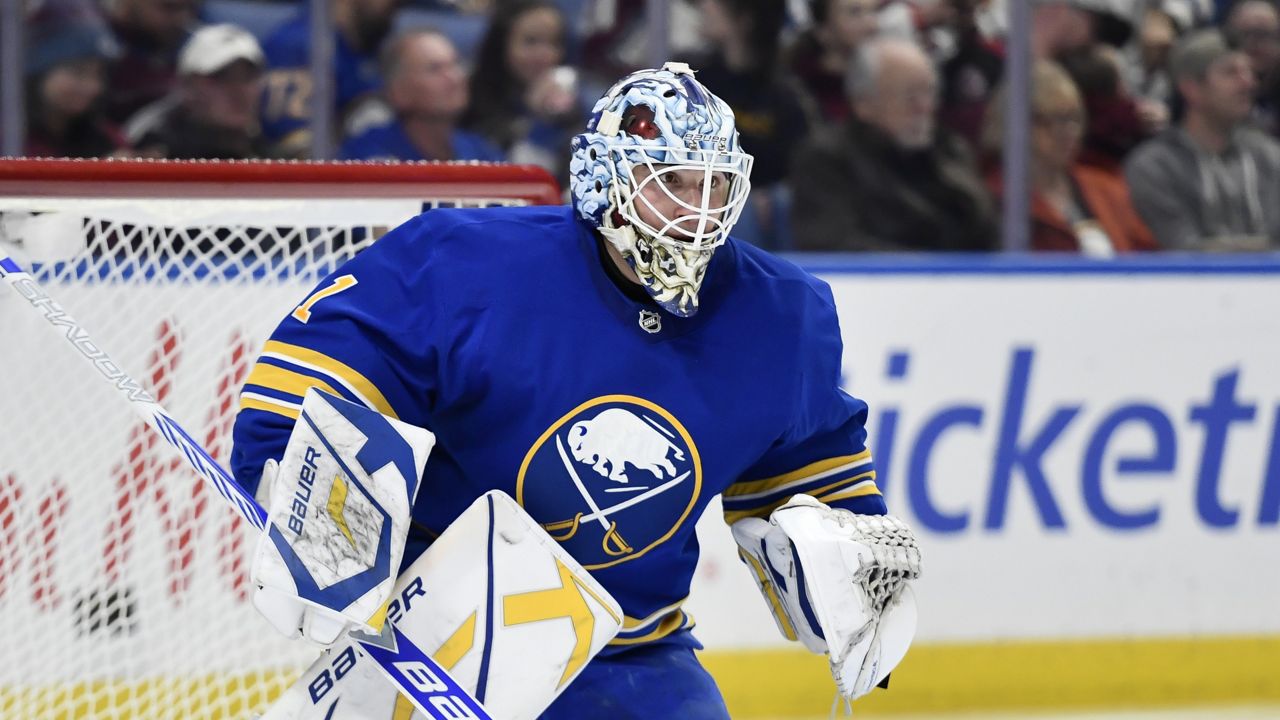Simply put, Buffalo Sabres captain Kyle Okposo was disappointed in the NHL's decision to ban usage of rainbow-colored stick tape in recognition and support of the LGBTQ+ community this season.
But that alone is too simple for this issue.
"My reaction was that the goal of what the league and the players are trying to achieve is not going to be met because of this decision," Okposo said to Spectrum News 1 on Monday after practice. "I can see what the narrative was going to be from it and that it wasn't going to in any way be positive. And that's what upset me the most is, OK, we do a lot of special things in this league. We have a platform because we're a professional organization in professional sports. And how do you use that platform to further the social agenda [or] the economic agenda? Whatever it is. In this case, [it’s] acceptance, diversity and inclusion. How do you move the needle forward? And when that decision came, I didn't think that the objective that we were trying to pursue got moved forward."
In December 2022, Russian President Vladimir Putin signed legislation that expanded country-wide restrictions on what it deems “LGBT propaganda," including promoting same-sex and non-heterosexual relationships. The global fallout from that meant that a handful of Russian NHL players opted out of participating in teams' Pride Nights last season in consideration of their safety and their family members who still live abroad, including former Sabres defenseman Ilya Lyubushkin. Many Russian players in the NHL return to Russia in the offseasons.
After Okposo's initial reaction, the captain has found himself trying to turn a negative situation into a positive one.
"All I've been seeing is there's just negativity around this whole thing. And it makes me sad, to be honest with you, that we can't continue to have a conversation or have conversations about how to positively impact this," Okposo said. "Like, the only thing that's happened from December of last year when this first started to now is negativity. And that's the sad part for me. So, OK, how do we shift the conversation? That's my whole goal as a leader and as somebody who has a voice in the sport is, how do we get this thing moving back in the right direction? What steps do we need to take and who do we need have conversations with?"
The league’s formal movement away from Pride and other cause-related engagements began in June, when Commissioner Gary Bettman told Sportsnet’s Elliotte Friedman that specialty jerseys worn in warmups and auctioned off for fundraisers have “become a distraction” after multiple players cited religious and safety reasons for not wanting to wear the jerseys with rainbow designs.
Okposo agrees with the commissioner’s comments that the overall controversy detracted from the goal of celebrating Pride and LGBTQ+ audiences in the first place.
"Yeah, I do. It was a distraction to what we were trying to do and what the vast majority of players in the league is trying to accomplish," Okposo said. "And, you know, it's an unenviable position to be to Gary [Bettman] in a sense, because he's trying to do what's right for the owners, do what's right for the league [and] do what's right for sponsors. He has a lot of different things to think about and a lot of times he has to be the bad guy. And in this instance, it's difficult because, like I said, it is a distraction from the goal, which is to make sure that everyone who comes to an NHL hockey game feels comfortable, feels accepted, feels welcome and wants to be a fan of our sport. And that's the ultimate goal, is to grow the game. It’s to know that you have a place in hockey and you have a place if you want it. It's a special game. It's given me a lot that I have in my life and I want to make sure that I'm reciprocating everything that I feel about this game outwardly. And I think that a lot of people are feeling the same."
As OutSports first reported the league’s ban on Pride Tape last week, the focus shifted from those who chose not to participate in these events for various reasons to eliminating an opportunity for those who wanted to participate in support of LGBTQ+ audiences. This comes just one decade after the league responsible for the highest level of hockey competition in the world took their first official steps into partnering with Pride and LGBTQ+ audiences.
In 2010, Chicago Blackhawks defenseman Brent Sopel brought the Stanley Cup to its first appearance in a Pride parade in honor of Brendan Burke, the youngest son of longtime NHL executive Brian Burke, whose coming out in 2009 made headlines across the sport. In 2013, the NHL first partnered with You Can Play Project, whose mission is “to ensure the safety and inclusion for all who participate in sports, including LGBTQ+ athletes, coaches and fans” according to their website. The Edmonton Oilers were the first NHL team to use Pride Tape when in 2016, the players used the product at a community relations event. The team’s community foundation also made a financial donation to the company in order to become a founding partner. Eventually, Pride Tape was sold in the NHL’s official league shop under their Hockey Is For Everyone outreach marketing mission.
In response to the ban on the rainbow tape, You Can Play states: “If Hockey is for Everyone, this is not the way forward.”
Players around the league have reacted to the news that Pride Tape is no longer an option for them as of now.
"I'll use the tape — if I have to buy it myself, I will, go about it that way,” Philadelphia Flyers forward Scott Laughton told media last week when asked how he would continue to honor Pride Night as an active advocate for the team’s event in years past.
Pride Tape cofounder Dr. Kristopher Wells offered free Pride Tape for Laughton and his teammates in response.
Boston Bruins captain Brad Marchand expressed disappointment at the inability to find compromise on this issue that makes all parties happy.
"Just seems like right now, you can't win," Marchand said to media last week. "There's got to be a line where we can all have our beliefs and support each other and be OK and not have tension. Just unfortunate we can't find common ground. It's tough when you can't win either way."
Edmonton Oilers captain Connor McDavid would like to see the decision reversed.
“I’ve expressed disappointment in not being able to wear the various jerseys or the tapes … whether that’s Pride Tape or pink tape or anything," McDavid said to media last week. "Like I said, it’s always something I’ve enjoyed. In terms of a league standpoint, is it something I’d like to see put back into place one day? Certainly, you know, but that’s not the way it is right now.”
Okposo says the Sabres have had team discussions about the issue and planned a formal discussion for Monday.
"I think that I don't want to speak for the entire group, but I think the vast majority of our group as a whole has a similar opinion to myself, which is, you know, they want people to feel comfortable. They want to be able to participate in events and show their support for different groups. And I think that that is something that has kind of always been a fight with the league, is like how much individuality do we have versus the team versus the league," Okposo said. "So we're going to continue to talk about it. We're going to continue to kind of gather a consensus. And then, you know, when guys feel comfortable about it, they can speak out for themselves or anything else we feel like needs to be said."
Spectrum News 1 has reached out to the NHL for comment, but has yet to hear back.



